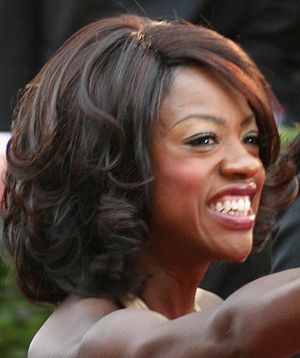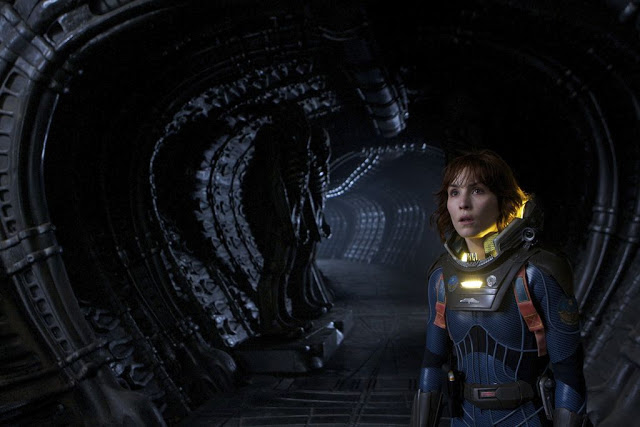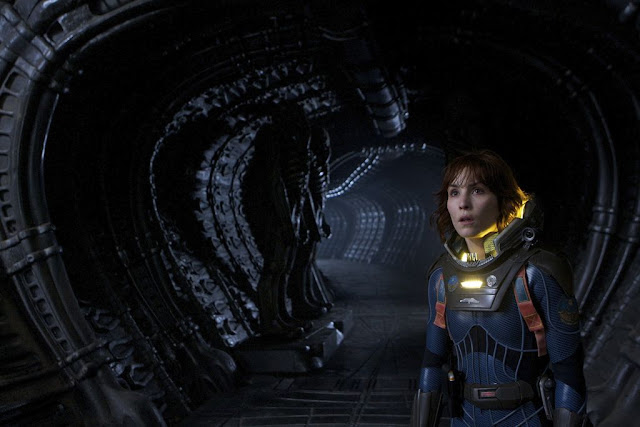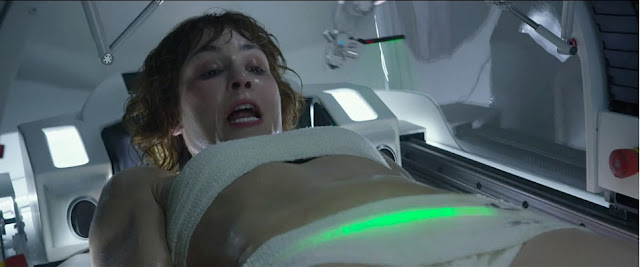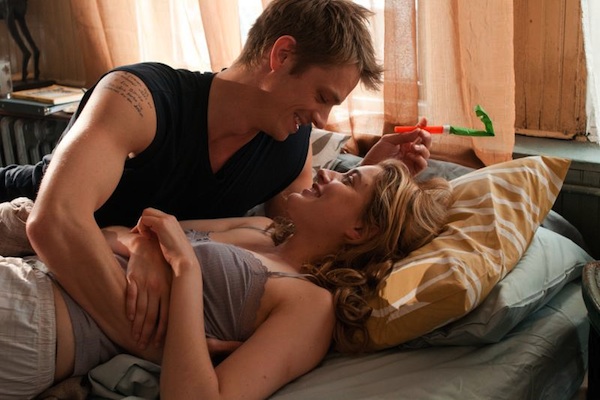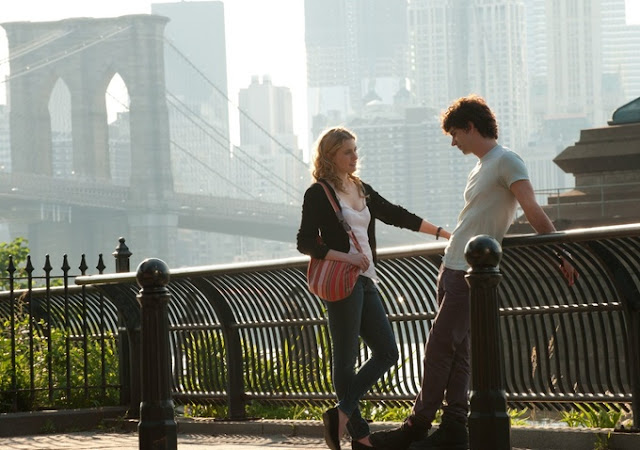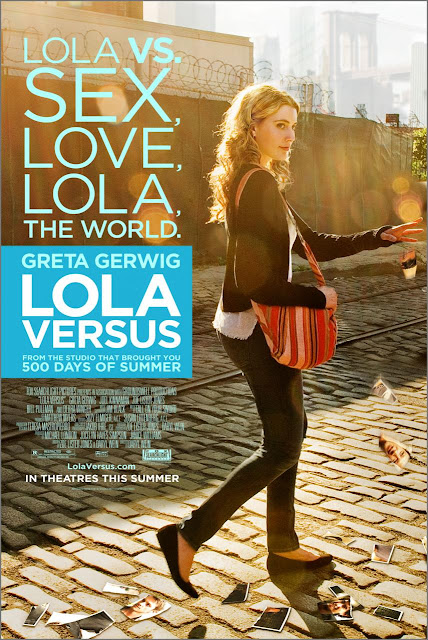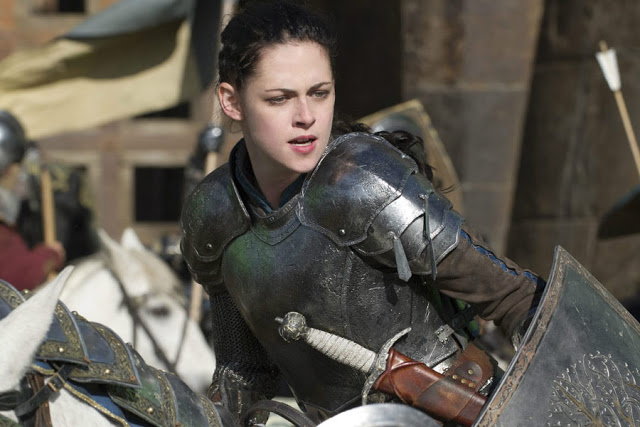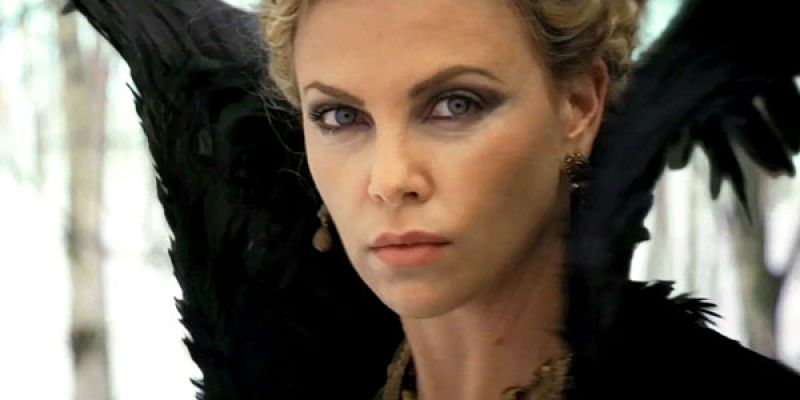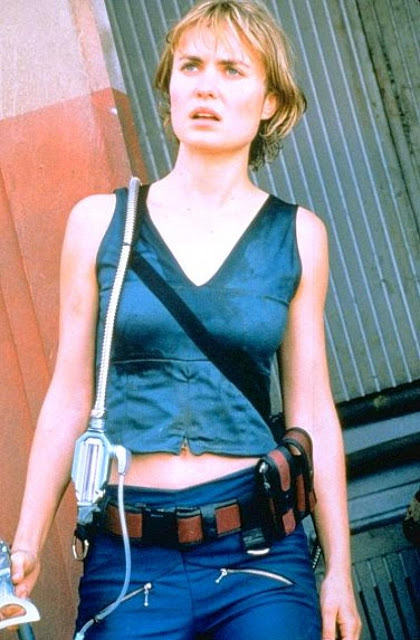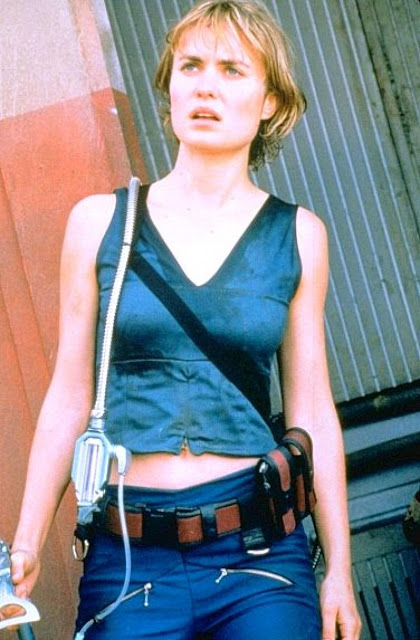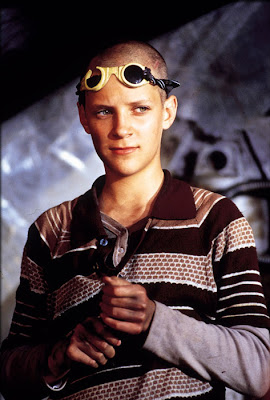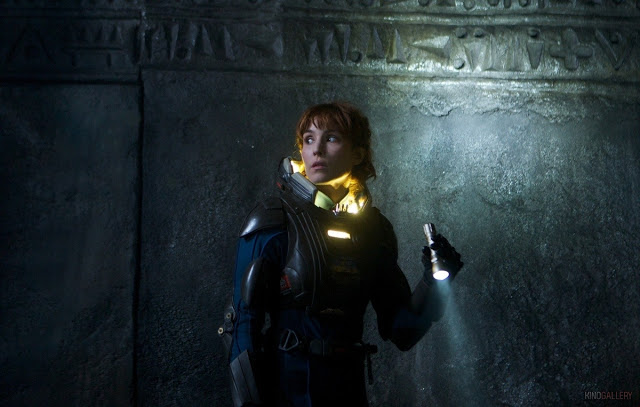 |
| Noomi Rapace (Dr. Elizabeth Shaw) in Prometheus |
Warning: massive spoilers ahead!
A pseudo-prequel to Alien, Prometheus raises existential themes of religion, god, faith, science, creation, mythology and evolution. While these are all worthy topics, I’m much more interested in Prometheus’ treatment of its female characters and its commentary on reproduction. Is director Ridley Scott’s new film a pro-choice metaphor advocating reproductive justice?
Here the incredibly skilled Noomi Rapace plays the female protagonist Dr. Elizabeth Shaw, an archaeologist guided by her curiosity and buoyed by her religious faith. She and her colleague/partner Charlie Holloway discover caves with paintings signifying our creators or “Engineers” as they call them. When corporate Weyland Industries (a pre-cursor to Alien’s Weyland-Yutani) funds their expedition, they go in search of the beginning of humanity…with horrifying consequences.
The film is problematic with its weak dialogue and flimsy characters. Aside from Rapace’s Shaw and Idris Elba’s Janek (Stringer Bell cigar-smoking and playing an accordion?? Yes, please!), I seriously couldn’t give two shits who lived and who died, which is particularly annoying since Alien rested on the strength of its nuanced character development. But where the film captivates is in its exploration of reproduction.
Patriarchy perpetuates rape culture and infringes on reproductive rights.
Alien centered on
rape and men’s fear of female reproduction. Littered with vaginal-looking aliens and phallic xenomorphs violating victims orally, these themes resurface. But this time around, Scott’s latest endeavor also adds abortion and infertility. As
ThinkProgress’ Alyssa Rosenberg asserts,
Prometheus bolsters the
Alien Saga’s themes of “exploration of bodily invasion and specifically women’s bodily autonomy.”
Holloway goes on a diatribe to Shaw about creation and meeting our creators. He says that everyone can create. Shaw responds, “Not me,” shedding tears as she laments her infertility, something rarely depicted on-screen. Their conversation seemed to comment on how society views women as broken and not fulfilling their ultimate purpose unless they give birth.
While Shaw doesn’t give birth, she does become pregnant.
When David the android (Michael Fassbender) obtains some of the mysterious “black goo” from the temple, he poisons Holloway by placing a drop in his drink. After Holloway and Shaw talk about creation and infertility, Shaw has sex with the infected Holloway.
After Holloway dies (torched by a flame-throwing-toting Vickers), David examines Shaw for any infection. He then tells her that she’s pregnant (say what??). She knows this is impossible because of her infertility. Even though she’s stunned by this revelation — because of its improbability and her infertility is a source of pain — Shaw wants it out of her immediately.
But David doesn’t want her to have an abortion, insisting she be put in stasis and trying to restrain her. Like Ash in Alien, it appears David had an agenda to try and keep the creature inside Shaw alive. David tries to thwart Shaw’s agency and bodily autonomy, forcing her to remain pregnant. Hmmm, sounds eerily similar to anti-choice Republicans with their invasive and oppressive legislation restricting abortion. No one has the right to tell someone what to do with their body.
After fighting her way past people, Shaw enters a medpod, a surgical “chamber,” which is only designed for male patients. Now before anyone says that the chamber was intended for secret passenger Weyland (a dude), it still subtly reinforces patriarchy nonetheless. Why couldn’t a medical chamber offer procedures for all genders rather than just defaulting its calibrations to male?
Undeterred, she programs the machine to remove a foreign object. She watches as her stomach is the mechanical arms remove the alien creature and then is stapled up. Hands down this was the most riveting scene (and squeamish…aside from that creepy eye scene), watching a terrified yet steely determined Shaw assert control over her body and her reproduction.
Now, not everyone agrees that Shaw was pregnant or that her procedure should be called an abortion.
Some say yes, others
argue no, and still others are
unsure. Rosenberg asserts it’s not really an abortion as Shaw “isn’t pregnant but rather infected” and the surgery doesn’t result in “the termination of her pregnancy but a premature birth.” But
Scott himself calls it a pregnancy.
For those who discount Shaw’s abortion because it’s a foreign object or not a traditional fetus, look at Breaking Dawn. Bella’s vampire/human fetus grew at a rapid rate, made her sick and almost destroyed her body. Yet she chose to keep it. My point is that Shaw could have as well. Instead, she chooses an abortion.
But whatever terminology you use — and I’m in the camp that calls it an abortion — you can’t ignore the abortion metaphor.
Rather than merely succumbing to the trappings of the
Mystical Pregnancy Trope, which reduces women to their reproductive organs, we instead see a metaphor for patriarchal constraints trying to strip women of their reproductive rights and bodily autonomy.
 |
| Dr. Elizabeth Shaw (actor Noomi Rapace) after having abortion in Prometheus |
But before I start jumping up and down that a summer blockbuster features an abortion, there’s a few probs here. The word abortion is never uttered. Nope, not once. Instead, it’s referenced as a “procedure.” When Shaw enters the medpod, she initially attempts to program a caesarean, again not an abortion.
Prometheus also suffers from some problematic gender depictions. While both Prometheus and Alien thrust their female leads into terrifying situations, Shaw and Ripley drastically differ, not only in their personalities and worldviews. But in the way the films treat them.
Alien possessed
a strong feminist commentary on sexist patriarchy silencing women’s voices and attempting to objectify and violate their bodies. Unlike Ripley, both Shaw and the icy, seemingly villainous Vickers are sexualized. Both Shaw and Vickers are punished — Vickers by falling into the stereotypical trap of being a cold, selfish shrew and Shaw for her sexuality. Although I’ve got to point out that while Vickers was definitely selfish (not stopping to help a stumbling Shaw when outrunning the crashing ship), I think she made some smart decisions surrounded by an assload of people making idiotic ones. And um, I don’t blame her for not wanting an infected Holloway onboard (which Ripley also tried to do with Kane in
Alien). Weyland also makes a sexist statement about inheritance and how David is the closest thing he has to a son, despite his flesh and blood daughter Vickers. It’s as if a daughter is meaningless to him.
Ripley wasn’t defined by her relationship to a man nor did she need a man to survive. But Shaw does…or at least an android taking the form of a man. Yes, she’s a resilient survivor. Although David makes a point to express his surprise at Shaw’s survival, saying he didn’t know she had it in her (ugh, cue bad pun). But aside from her self-induced abortion, Shaw ultimately must rely on others: the squidlike xenomorph extracted during her abortion to save her from a violent Engineer as well as David to escape the planet as he can fly the Engineers’ spacecraft. Although Shaw is the one who determines their course.
Perhaps these gender problems are meant as a commentary on the incessant sexism plaguing today’s society. Or maybe Ripley was such a quintessential feminist film icon that this film pales in comparison.
“Mixing in allusions to birth, the body as battleground, and a female character’s absolute will to regain control belong in this series as much as slimy extraterrestrials. It’s what the Alien films do well, and what Prometheus does best.”
Prometheus is an incredibly flawed film. But when reproductive justice faces a daily barrage of attacks, I have to applaud its efforts to depict its female protagonist not only choosing an abortion, but fighting for her right to exercise autonomy over her body. Especially when so few films and TV series do.
